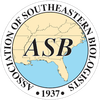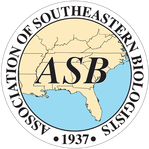R.H. Martin Plenary Session
Including Diversity in STEM
Wednesday March 24, 4:00 - 6:00 PM
As leaders around the world grapple with current conversations around diversity, equity, and inclusion, ASB has instituted a faculty and industry panel discussion on diversity and inclusion to keep us informed and to provide some thought leadership to help address some of those issues in the biology and the natural sciences disciplines. Panelists from diverse backgrounds will also discuss how diverse students can be successful in the biological sciences as well as share the value of diversity and inclusion in academia and insights as to how panelists have excelled in their field of study. All are welcome to engage in the conversation.
Moderator

Dr. Loretta Ovueraye, Miami Dade College
Dr. Ovueraye serves Miami Dade College as the Vice Provost Workforce Programs & Professional Learning. She has previously served Miami Dade College as the Padron campus Dean of Faculty , Baton Rouge Community College’s (BRCC) Interim Vice Chancellor for Academic Affairs and Dean of Science, Technology, Engineering and Mathematics (STEM) division. Prior to joining BRCC, she served as the Department Chair for Biology, Health, Wellness, and Funeral Service Education, Honors College Director and various other roles at MDC. She began her career in higher education as an environmental science program coordinator and faculty member developing programs to enhance students' experiences in and out of the classroom. Her professional career over the last 20 years has included working in higher education as a full-time administrator serving in various capacities and overall as a student success change agent for academic and technical education programs. She has managed several Federal grants including a Title V, USDA-NIFA grant, and current S-STEM project. Dr. Ovueraye is an active member of the Association of Southeaster Biologist and currently serves as it’s secretary and past co-chair of the Human diversity committee. She has contributed to the study of microbial activity in the remediation of Sulphur oxalate containing water and minority student education. In addition to contributions described above, as one deeply engaged in the STEM education field, she worked with a team of collaborators to contribute to the 2014/15 the Southeast Regional PULSE (SERP) Institute report as part of the Vision and Change in Undergraduate Biology Education: A Call to Action [AAAS, 2011]; Funded by the National Science Foundation and the Howard Hughes Medical Institute.
"Over my working life as a college administrator, I have strived to promote the use of program resources to build communities and a learner centered environments. My philosophy is that through guided engagement, students can learn to use their education to gain autonomy, exercise personal responsibility for choices and decisions, as well as control their own learning. I work to ensure that through my efforts students will develop and grow to be successful and productive citizens. I am honored to serve the educational community toward achieving its goals." said Dr. Ovueraye. "
Dr. Ovueraye holds a doctoral degree in education from Northeastern University in Boston, a master's degree in Environmental Science from Imperial College in London, and a Bachelor's degree in Microbiology from Edo State University in Nigeria.
Dr. Ovueraye serves Miami Dade College as the Vice Provost Workforce Programs & Professional Learning. She has previously served Miami Dade College as the Padron campus Dean of Faculty , Baton Rouge Community College’s (BRCC) Interim Vice Chancellor for Academic Affairs and Dean of Science, Technology, Engineering and Mathematics (STEM) division. Prior to joining BRCC, she served as the Department Chair for Biology, Health, Wellness, and Funeral Service Education, Honors College Director and various other roles at MDC. She began her career in higher education as an environmental science program coordinator and faculty member developing programs to enhance students' experiences in and out of the classroom. Her professional career over the last 20 years has included working in higher education as a full-time administrator serving in various capacities and overall as a student success change agent for academic and technical education programs. She has managed several Federal grants including a Title V, USDA-NIFA grant, and current S-STEM project. Dr. Ovueraye is an active member of the Association of Southeaster Biologist and currently serves as it’s secretary and past co-chair of the Human diversity committee. She has contributed to the study of microbial activity in the remediation of Sulphur oxalate containing water and minority student education. In addition to contributions described above, as one deeply engaged in the STEM education field, she worked with a team of collaborators to contribute to the 2014/15 the Southeast Regional PULSE (SERP) Institute report as part of the Vision and Change in Undergraduate Biology Education: A Call to Action [AAAS, 2011]; Funded by the National Science Foundation and the Howard Hughes Medical Institute.
"Over my working life as a college administrator, I have strived to promote the use of program resources to build communities and a learner centered environments. My philosophy is that through guided engagement, students can learn to use their education to gain autonomy, exercise personal responsibility for choices and decisions, as well as control their own learning. I work to ensure that through my efforts students will develop and grow to be successful and productive citizens. I am honored to serve the educational community toward achieving its goals." said Dr. Ovueraye. "
Dr. Ovueraye holds a doctoral degree in education from Northeastern University in Boston, a master's degree in Environmental Science from Imperial College in London, and a Bachelor's degree in Microbiology from Edo State University in Nigeria.
Panelists
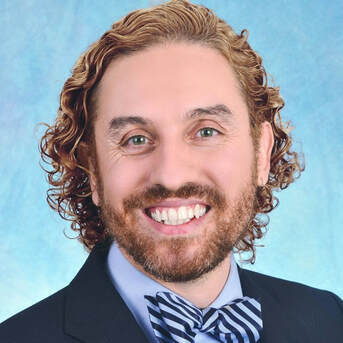
Dr. Edward Moreira Bahnson, University of North Carolina at Chapel Hill
Dr. Edward Moreira Bahnson is an Assistant Professor at the Dept. of Surgery and the Center for Nanotechnology in Drug Delivery at UNC Chapel Hill. Dr. Bahnson’s research program focuses on the study of arterial disease. He aims to understand how redox dysfunction affects arterial disease progression with the goal of developing redox-based targeted therapies for the vasculature. His personal experiences as a queer Latino immigrant and first-generation college graduate have shaped and fueled an interest in improving equity and inclusion in science and medicine. He has studied how LGBTQ cultural training can impact allyship in physicians with the goal to provide intentionally inclusive care to LGBTQ patients. Dr. Bahnson serves as Interim Chair of the LGBTQ Life Provost Committee at UNC and he is Diversity Equity and Inclusion Chair of the Society of Redox Biology and Medicine.
Dr. Bahnson is originally from Montevideo, Uruguay, the second most southern capital in the world. Dr. Bahnson holds a B.Sc. in Biochemistry from the University of Uruguay, and moved to the US to pursue his doctorate. He received his Ph.D. in Biomedical Sciences working with Drs. Nicola Brasch (Kent State University), June Yun (NEOMED), and Donald Jacobsen (Cleveland Clinic). His dissertation, entitled “Vascular Biochemistry of Vitamin B12,” explored the non-coenzyme effects of B12 derivatives on vascular redox homeostasis. For his postdoctoral training, he joined the Simpson Querrey Institute and the Division of Vascular Surgery at Northwestern University. He focused on the prevention of restenosis after vascular interventions using local and targeted redox interventions.
On a personal note Dr. Bahnson enjoys singing (he has been a part of various choruses over the years), and dancing tango. He also enjoys cooking and baking, and going for a walk with his husband Matthew, and their dog Wellington. Last fall Edward and Matthew became parents to twins Tori and Bella via gestational surrogacy, so all the cooking, baking, choir singing have come to a sudden stop! The group walks now have two new members who thoroughly enjoy being carried around the neighborhood until they fall asleep.
Dr. Edward Moreira Bahnson is an Assistant Professor at the Dept. of Surgery and the Center for Nanotechnology in Drug Delivery at UNC Chapel Hill. Dr. Bahnson’s research program focuses on the study of arterial disease. He aims to understand how redox dysfunction affects arterial disease progression with the goal of developing redox-based targeted therapies for the vasculature. His personal experiences as a queer Latino immigrant and first-generation college graduate have shaped and fueled an interest in improving equity and inclusion in science and medicine. He has studied how LGBTQ cultural training can impact allyship in physicians with the goal to provide intentionally inclusive care to LGBTQ patients. Dr. Bahnson serves as Interim Chair of the LGBTQ Life Provost Committee at UNC and he is Diversity Equity and Inclusion Chair of the Society of Redox Biology and Medicine.
Dr. Bahnson is originally from Montevideo, Uruguay, the second most southern capital in the world. Dr. Bahnson holds a B.Sc. in Biochemistry from the University of Uruguay, and moved to the US to pursue his doctorate. He received his Ph.D. in Biomedical Sciences working with Drs. Nicola Brasch (Kent State University), June Yun (NEOMED), and Donald Jacobsen (Cleveland Clinic). His dissertation, entitled “Vascular Biochemistry of Vitamin B12,” explored the non-coenzyme effects of B12 derivatives on vascular redox homeostasis. For his postdoctoral training, he joined the Simpson Querrey Institute and the Division of Vascular Surgery at Northwestern University. He focused on the prevention of restenosis after vascular interventions using local and targeted redox interventions.
On a personal note Dr. Bahnson enjoys singing (he has been a part of various choruses over the years), and dancing tango. He also enjoys cooking and baking, and going for a walk with his husband Matthew, and their dog Wellington. Last fall Edward and Matthew became parents to twins Tori and Bella via gestational surrogacy, so all the cooking, baking, choir singing have come to a sudden stop! The group walks now have two new members who thoroughly enjoy being carried around the neighborhood until they fall asleep.
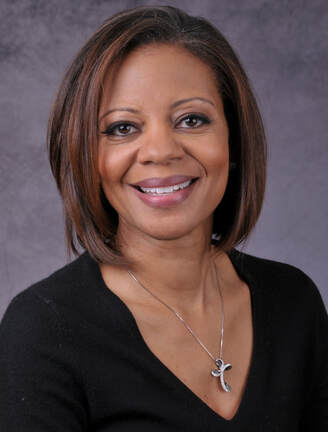
Dr. Kelly Mack, Association of American Colleges and Universities
Dr. Kelly Mack is the Vice President for Undergraduate STEM Education and Executive Director of Project Kaleidoscope at the Association of American Colleges and Universities (AAC&U). In this capacity, Dr. Mack provides leadership for the organization’s mission level commitments to quality and inclusion through the delivery of world class professional development aimed at empowering our nation’s finest STEM faculty to competitively train and educate more STEM students. Prior to joining AAC&U, Dr. Mack was the Senior Program Director for the National Science Foundation ADVANCE Program while on loan from the University of Maryland Eastern Shore where, as a Professor of Biology, she taught courses in Physiology and Endocrinology for 17 years.
Dr. Mack’s holistic approach to STEM reform is grounded in a strategic vision that foregrounds inclusion as an immutable factor for achieving excellence in undergraduate STEM education. Her leadership in STEM reform has led to: significant increases in the capacity of STEM faculty to implement culturally responsive pedagogies, major shifts in the ways in which leadership development for STEM faculty is delivered, and the expansion of both physical and virtual convening platforms for knowledge generation, exchange, and dissemination.
Recognized as a national thought leader in higher education, Dr. Mack’s work has been highlighted in Diverse Magazine and U.S. News and World Report. Currently, she is an advisor to several institutional transformation initiatives at NSF-funded ADVANCE institutions, as well as other national STEM reform collaboratives. She is also co-founder and chair of the board of the Society of STEM Women of Color, Inc., and has served as member of numerous board and national committees.
Dr. Mack earned the BS degree in Biology from the University of Maryland Eastern Shore and, later, the PhD from Howard University in Physiology. She has had extensive training and experience in the area of cancer research with her research efforts focusing primarily on the use of novel antitumor agents in breast tumor cells, as well as the use of bioflavonoids in the regulation of estrogen receptor positive (ER+) and estrogen receptor negative (ER-) breast tumor cell proliferation. Most recently, her research efforts have examined STEM leadership development and the impact of mindfulness on STEM faculty self-efficacy.
Dr. Kelly Mack is the Vice President for Undergraduate STEM Education and Executive Director of Project Kaleidoscope at the Association of American Colleges and Universities (AAC&U). In this capacity, Dr. Mack provides leadership for the organization’s mission level commitments to quality and inclusion through the delivery of world class professional development aimed at empowering our nation’s finest STEM faculty to competitively train and educate more STEM students. Prior to joining AAC&U, Dr. Mack was the Senior Program Director for the National Science Foundation ADVANCE Program while on loan from the University of Maryland Eastern Shore where, as a Professor of Biology, she taught courses in Physiology and Endocrinology for 17 years.
Dr. Mack’s holistic approach to STEM reform is grounded in a strategic vision that foregrounds inclusion as an immutable factor for achieving excellence in undergraduate STEM education. Her leadership in STEM reform has led to: significant increases in the capacity of STEM faculty to implement culturally responsive pedagogies, major shifts in the ways in which leadership development for STEM faculty is delivered, and the expansion of both physical and virtual convening platforms for knowledge generation, exchange, and dissemination.
Recognized as a national thought leader in higher education, Dr. Mack’s work has been highlighted in Diverse Magazine and U.S. News and World Report. Currently, she is an advisor to several institutional transformation initiatives at NSF-funded ADVANCE institutions, as well as other national STEM reform collaboratives. She is also co-founder and chair of the board of the Society of STEM Women of Color, Inc., and has served as member of numerous board and national committees.
Dr. Mack earned the BS degree in Biology from the University of Maryland Eastern Shore and, later, the PhD from Howard University in Physiology. She has had extensive training and experience in the area of cancer research with her research efforts focusing primarily on the use of novel antitumor agents in breast tumor cells, as well as the use of bioflavonoids in the regulation of estrogen receptor positive (ER+) and estrogen receptor negative (ER-) breast tumor cell proliferation. Most recently, her research efforts have examined STEM leadership development and the impact of mindfulness on STEM faculty self-efficacy.
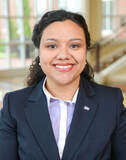
Dr. Veronica Segarra, High Point University
Veronica Segarra, Ph.D. completed her PhD in Biophysics and Biochemistry at Yale and her BS in Biochemistry at the University of Miami. Her contributions to science have come in the form of research breakthroughs in the study of budding yeast proteins that coordinate vesicular trafficking pathways, including clathrin, auxilin, and Atg27. Her lab at High Point University (HPU) is not only the home base for her research program, but a place where undergraduate students receive one‐on‐one mentoring as they strive to develop their identity in science and research. Dr. Segarra is Interim Chair of the Biology Department at HPU and the co-PI on the National Science Foundation (NSF) grants that funded the creation of ACCESS and ACCESS+ (grant numbers: 1744098, 2017953), multi-professional society organizations that advocate for equity and inclusivity in scientific communities.
Veronica Segarra, Ph.D. completed her PhD in Biophysics and Biochemistry at Yale and her BS in Biochemistry at the University of Miami. Her contributions to science have come in the form of research breakthroughs in the study of budding yeast proteins that coordinate vesicular trafficking pathways, including clathrin, auxilin, and Atg27. Her lab at High Point University (HPU) is not only the home base for her research program, but a place where undergraduate students receive one‐on‐one mentoring as they strive to develop their identity in science and research. Dr. Segarra is Interim Chair of the Biology Department at HPU and the co-PI on the National Science Foundation (NSF) grants that funded the creation of ACCESS and ACCESS+ (grant numbers: 1744098, 2017953), multi-professional society organizations that advocate for equity and inclusivity in scientific communities.
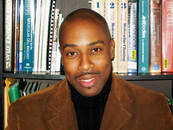
Dr. Selwyn Williams, Miami Dade College
Selwyn Williams is an Assistant Professor of Biology and the Program Coordinator of the Bachelor of Science in Biological Sciences (BS-BS) program at Miami Dade College (MDC). He holds a Ph.D. in biology from the City University of New York (CUNY) Graduate School & University Center with a sub-specialization in molecular, cellular, and developmental biology. He is also a Visiting Research Collaborator at Princeton University, where he conducted his postdoctoral training studying the effects of the extracellular matrix on cell behavior during wound healing and tissue remodeling. His research at MDC focuses on genotoxicity analyses of urban waterways in Miami, FL. As the lead faculty for the BS program he teaches a variety of courses including genetics, molecular & cell biology, immunology, human physiology, anatomy & physiology and general biology. His teaching interests are centered on the development of innovative high impact pedagogical practices designed to transform STEM education and increase the success of historically underrepresented minorities in STEM careers.
Selwyn Williams is an Assistant Professor of Biology and the Program Coordinator of the Bachelor of Science in Biological Sciences (BS-BS) program at Miami Dade College (MDC). He holds a Ph.D. in biology from the City University of New York (CUNY) Graduate School & University Center with a sub-specialization in molecular, cellular, and developmental biology. He is also a Visiting Research Collaborator at Princeton University, where he conducted his postdoctoral training studying the effects of the extracellular matrix on cell behavior during wound healing and tissue remodeling. His research at MDC focuses on genotoxicity analyses of urban waterways in Miami, FL. As the lead faculty for the BS program he teaches a variety of courses including genetics, molecular & cell biology, immunology, human physiology, anatomy & physiology and general biology. His teaching interests are centered on the development of innovative high impact pedagogical practices designed to transform STEM education and increase the success of historically underrepresented minorities in STEM careers.
